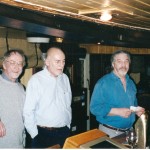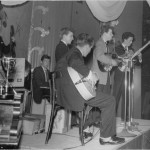The Bournemouth Years (Washboard)
 It was late 1957. The Queen wasn’t long out of her twenties, and Harold Macmillan had yet to tell us that we’d never had it so good. After the Suez fiasco of the previous year, the country was at peace. That was more than could be said for me. I might have grown used to the effects of puberty as my fifteenth birthday approached, but I still couldn’t see what function it was supposed to serve, other than to endow me with a complexion reminiscent of a lunar landscape. One side effect of puberty, however, seemed to be that the Hit Parade, as we still called it, was getting more exciting. No longer did we have to make do with the occasional buzz when Guy Mitchell or Frankie Laine temporarily broke the stranglehold of the Stargazers and Ruby Murray on the charts. Two years previously, the seismic wave of rock’n’roll, spearheaded by Bill Haley and Elvis Presley, had crossed the Atlantic and hit Britain hard. Though few people realised it then, that was to change society far more than the Anglicisation of pop music by the Beatles several years later, but to those of us in our early teens it was enough just to soak up the excitement.
It was late 1957. The Queen wasn’t long out of her twenties, and Harold Macmillan had yet to tell us that we’d never had it so good. After the Suez fiasco of the previous year, the country was at peace. That was more than could be said for me. I might have grown used to the effects of puberty as my fifteenth birthday approached, but I still couldn’t see what function it was supposed to serve, other than to endow me with a complexion reminiscent of a lunar landscape. One side effect of puberty, however, seemed to be that the Hit Parade, as we still called it, was getting more exciting. No longer did we have to make do with the occasional buzz when Guy Mitchell or Frankie Laine temporarily broke the stranglehold of the Stargazers and Ruby Murray on the charts. Two years previously, the seismic wave of rock’n’roll, spearheaded by Bill Haley and Elvis Presley, had crossed the Atlantic and hit Britain hard. Though few people realised it then, that was to change society far more than the Anglicisation of pop music by the Beatles several years later, but to those of us in our early teens it was enough just to soak up the excitement.
At first, it didn’t occur to us to try and play this new music. With the exception of Tommy Steele and Tony Crombie and his Rockets, rock’n’roll was all-American, i.e. it might as well have come from Mars, and we were the lowly earthlings, content merely to worship it from afar. But another new form of music was starting to take shape in a quieter way, and it was this that was occupying my thoughts as I dreamed my way through a divinity lesson in form Upper 4B of Bournemouth School. Some of my classmates had started a skiffle group.
The term “skiffle” goes back at least as far as the Great Depression, but in late 1950s Britain it had come to mean American folk songs played using, in part, homemade instruments such as tea chest bass, and washboard. If you knew someone whose parents could run to the cost of an acoustic guitar, you had all the ingredients needed to put a group together. Talent was optional.
I’d played the piano since I was three, but the drums seemed a much cooler instrument, and a washboard was an acceptable alternative for the economically-challenged. Although Lonnie Donegan’s skiffle group used “proper” instruments, The Vipers and Chas McDevitt used washboards, and so, kitted out with my mother’s zinc washboard and a set of thimbles from Woolworth’s, I approached my classmate, Ian “Benny” Bennett, the leader of the group, and found myself the following night at his parents’ flat for my very first band practice.
The initial line-up was hardly the classic model. In addition to two guitars and a tea chest bass, there were three percussionists, including me, before natural wastage took its toll, leaving me as sole washboard player, soon widening my function by a pair of bongos, which I later persuaded Lonnie Donegan to autograph.
Over the following weeks, as we wrestled our way through the musical complexities of Streamline Train, Don’t You Rock Me Daddy-o, Diggin’ my Potatoes, etc., the group began to improve, aided by a new member, Eddie Evans (whose real name – though he didn’t know it at the time – was Ed Roberts) on guitar and vocals. Proper gigs, or “dates” as we then called them, were non-existent, at least for us, but we began entering a succession of skiffle contests under our new name of The Tennessee Tramps, culminating in a skiffle contest, organised by Ken Baily, to raise funds for the nearly bankrupt Bournemouth Symphony Orchestra (the Hallé must have laughed their socks off at that). We didn’t win, (the early contests were usually won by the Volta skiffle group or the Blue Earth River Boys), but we were interviewed by Alan Whicker for BBC television’s Tonight programme, which then enjoyed an average viewing audience of seven million people. Fame at last.
 Around that time, we somehow talked our way into doing an interval slot at the Saturday morning picture show at the Moderne Cinema in Moordown, the district of Bournemouth in which I lived. This was an important gig for me, because, for the first time, I was going to sing a number. We worked our way through our programme, my nerves steadily worsening as we did so, and then it was time for me to step out to the front and face two hundred kids, who were waiting impatiently for the Hopalong Cassidy main feature to begin. With the washboard hanging from my neck by a string, I launched into Frankie and Johnnie – not a song noted for its upbeat tempo. As I worked my way desperately through all fourteen verses, I began to sense a certain restlessness amongst the audience, but I managed to get to verse ten before the first coins started hitting the stage. Undaunted, I plodded gamely on to the end, and then gathered up the coins. They came to sixpence ha’penny.
Around that time, we somehow talked our way into doing an interval slot at the Saturday morning picture show at the Moderne Cinema in Moordown, the district of Bournemouth in which I lived. This was an important gig for me, because, for the first time, I was going to sing a number. We worked our way through our programme, my nerves steadily worsening as we did so, and then it was time for me to step out to the front and face two hundred kids, who were waiting impatiently for the Hopalong Cassidy main feature to begin. With the washboard hanging from my neck by a string, I launched into Frankie and Johnnie – not a song noted for its upbeat tempo. As I worked my way desperately through all fourteen verses, I began to sense a certain restlessness amongst the audience, but I managed to get to verse ten before the first coins started hitting the stage. Undaunted, I plodded gamely on to the end, and then gathered up the coins. They came to sixpence ha’penny.
It was my first paid gig.
Fancy a bit more? Okay, carry on to…


